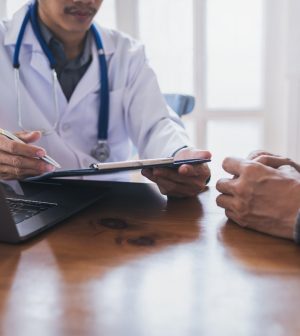- Could Your Grocery Store Meat Be Causing Recurring UTIs?
- Are You Making This Expensive Thermostat Error This Winter?
- Recognizing the Signs of Hypothyroidism
- 10 Strategies to Overcome Insomnia
- Could Artificial Sweeteners Be Aging the Brain Faster?
- Techniques for Soothing Your Nervous System
- Does the Water in Your House Smell Funny? Here’s Why
- Can a Daily Dose of Apple Cider Vinegar Actually Aid Weight Loss?
- 6 Health Beverages That Can Actually Spike Your Blood Sugar
- Treatment Options for Social Anxiety Disorder
Most Americans Don’t Know That Family Doctors Can Prescribe Anti-Opioid Meds

Most people addicted to opioids and their loved ones are unaware that their primary care doctor can prescribe a medication to treat the disorder, a new nationwide survey reveals.
“We’ve made great strides in making it easier for primary care doctors to prescribe these safe and effective treatments, but our study indicates a critical disconnect between the need for medications for opioid use disorder and people’s knowledge about how to access them,” said lead author Brandon del Pozo, an assistant professor of medicine and public health at Brown University.
“Science, public health, insurance policy and public perception all must align to improve access to treatment,” he added.
His team reviewed results of a June 2023 survey that included more than 1,200 people nationwide.
While 82% of respondents who said they had misused prescription drugs or illicit opioids expressed comfort in seeking addiction treatment from their primary care doctor, most were unaware that they can prescribe buprenorphine, a medication to treat it. And 13% incorrectly believed they could not.
Two-thirds of respondents who had not misused opioids said they’d be comfortable referring loved ones to primary care doctors for opioid-use treatment.
Black respondents were least likely to know they could receive medications for the disorder from their primary care doctor — a finding researchers called significant, because it may impede their access to treatment.
The findings suggest a need to make more Americans of the opportunity to access treatment, researchers said. They noted that decades of research have proven the benefit of existing medications for opioid use disorder, including buprenorphine and methadone.
“Primary care is often people’s first point of contact in the health care system and can serve as a crucial setting to talk about addiction and receive lifesaving medications,” Dr. Nora Volkow, director of the National Institute on Drug Abuse, said in a NIDA news release. “We need to provide education and support so that patients feel empowered to seek help from their primary care physician, and their doctors feel prepared to help them.”
Changes in federal policy have removed some requirements such as the need for specialized training that impeded primary care doctors’ in prescribing buprenorphine. A year after the change, the number of prescribers has increased but the number of patients receiving the medication has not.
While fewer than 2,500 doctors nationwide specialize in addiction medicine, there are 209,000 primary care physicians. Channeling addiction treatment through them could have a major benefit for public health, researchers said.
The respondents were 57% female, 43% male. Sixty-eight percent were white, 12% Black, 15% Hispanic/Latino, and 5% multiracial. Fifty-three percent agreed that a primary care doctor’s office should be a place to get treated for opioid use disorder; 24% strongly agreed.
The authors said future research should look into ways to increase public awareness of the role primary care doctors can play in fighting the opioid epidemic — similar to awareness campaigns for HIV testing or cancer screening.
“By increasing public awareness and demand, primary care physicians may be more incentivized to offer medications for opioid use disorder, especially with appropriate clinical and administrative support,” the authors said.
The findings were published June 28 in the journal JAMA Network Open. The study was funded by the National Institutes of Health
More information
If you or someone you know is struggling or in crisis, call or text 988 or chat at 988lifeline.org. Or visit FindSupport.gov. If you are ready to seek treatment, visit FindTreatment.gov or call 800-662-HELP.
SOURCE: National Institute on Drug Abuse, news release, June 28, 2024
Source: HealthDay
Copyright © 2026 HealthDay. All rights reserved.










